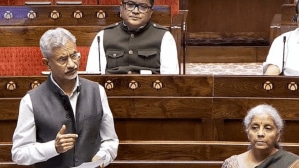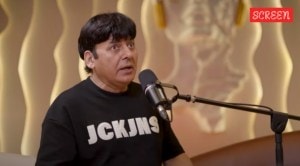Click here to follow Screen Digital on YouTube and stay updated with the latest from the world of cinema.
Aditya Chopra: The businessman Yash Chopra never was
On Aditya Chopra's 53rd birthday today, let's take a look at how he didn't just inherit a cinematic dynasty, but also rebuilt the entire kingdom with his business acumen.
 Aditya Chopra turns 53. (Photo: Express Archives)
Aditya Chopra turns 53. (Photo: Express Archives)When you Google ‘define a good businessman,’ the AI assistant doesn’t hesitate: ‘A good businessman is someone who is skilled and successful in business, demonstrating strong leadership, decision-making, financial acumen, and an understanding of market dynamics.’ If anyone in the Hindi film industry fits that definition with surgical precision, it is Aditya Chopra — the heir to a cinematic dynasty, who didn’t just inherit the throne but rebuilt the entire kingdom. Born with a silver spoon, Aditya didn’t just hold on to it, he forged it into gold. As actor Anil Kapoor aptly put in Netflix documentary, The Romantics, “Aditya is one of those few sons who, I think, has surpassed his father’s legacy.”
And that legacy? It belonged to the towering figure of Yash Chopra, a romantic visionary whose films defined Bollywood’s golden era. However, his business instincts often lagged behind his artistic flair.
Yash Chopra: The artist who shied away from the business
Yash Chopra began his career under the shadow of his elder brother B.R. Chopra. After directing five films as a salaried employee, Yash finally stepped out on his own and founded Yash Raj Productions in 1970. Soon, he delivered a smashing hit with Daag (1973). This was followed by a series of classics — Deewar (1975), Kabhi Kabhie (1976), Trishul (1978), Kaala Patthar (1979).
But success, like fashion, is seasonal. In 1981, he released his dream project Silsila. It flopped. And so did every film he made through the 80s. The country was changing. India was talking about caste-based reservations, the Ayodhya dispute, civil rights, and social justice. Yash Chopra was still filming tulips in Kashmir. The audience had moved on. The director hadn’t. A mistake that Aditya Chopra learnt from.
Aditya Chopra: The strategist who studied every failure
“He used to have a book in his room. In these books he used to write box office expectation, his analysis, and eventuality. He has done this for decades. He used to have one fat book,” shared Karan Johar as he spoke about Aditya Chopra in The Romantics.
Hrithik Roshan added, “The whole film used to be broken down into categories, column and questions and then he had the box office numbers. He did all this when he was 12 or 13 years old. And he did this over and over again.”
“Now when you look at these things, you know that these are the things that make him the director-producer he is,” said Abhishek Bachchan.
In 1989, Yash Chopra returned with Chandni, a hit that revived his career. But he never ventured beyond romance. A comfort zone that Aditya had already begun to challenge. When Lamhe flopped, a young Aditya (who worked as an AD in the film) had predicted it. Not because he knew the box office, but because he understood the audience.
“This was the first film I put so much of myself into, and I realised… I am a slave to the audience. That shaped me. I decided I wouldn’t let success affect me, so failure wouldn’t break me,” said Aditya in The Romantics.
Aditya Chopra first proved his business acumen when he decided to self-finance his debut film Dilwale Dulhaniya Le Jayenge (1995). That single decision changed the trajectory of Yash Raj Films. “Imagine sharing 50% of DDLJ’s revenues, I don’t think we’d be where we are today”, said Aditya Chopra. The decision became the seed that funded YRF’s transformation into a full-blown media empire.
The transformation of YRF
In 2004, YRF launched its own music label, eliminating third-party licensing. In 2005, the production house launched YRF Studios — a 20 acre facility offering multiple services in filmmaking. Eventually, the director decided to produce multiple films a year.
“We used to do one film in two years,” Aditya said in his rare interview in the docuseries The Romantics. “I thought, if we know how to produce, why not do more and see where it takes me as a producer?”
Yash Raj Films, once synonymous with classic romance, underwent a bold transformation under Aditya Chopra. In 2004, he shocked the industry by announcing a diverse slate: Hum Tum (a fresh romantic comedy), Dhoom (a genre-defining action thriller), and Veer-Zaara (a sweeping cross-border love story). All three released the same year — and all became commercial hits. With this move, Aditya not only expanded the studio’s creative horizon but also proved that YRF could thrive beyond its romantic legacy.
Apart from direction and production, through YRF Talent, Aditya Chopra also launched the careers of actors Anushka Sharma, Ranveer Singh, and Bhumi Pednekar. He was the visionary, who advised Shah Rukh Khan to not shut doors for romantic films–the advise which made him a global star. He is the man who spotted a filmmaker in Karan Johar (who otherwise was convinced to go to Paris to learn fashion designing). He created the YRF Spy Universe with his Ek Tha Tiger franchise, War and Pathaan. This is the closest India has come to a Marvel-style franchise.
While Yash Chopra gave Bollywood its most beautiful dreams, Aditya Chopra made sure those dreams were bankrolled, protected, and owned.


Photos
Photos


- 01
- 02
- 03
- 04
- 05






























